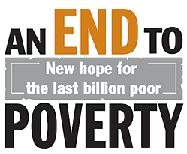
from the March 12, 2008 edition
What it takes to open a door for the poor
Big levers are within reach, but tend to be overlooked or controversial.
By Mark Lange
San Francisco - The real work of lifting the last billion out of poverty, the experienced and the expert will tell you, happens country by country, village by village: Digging wells, delivering bed nets, building schools. Faced with this reality, the greatest asset anyone from a wealthy nation might bring to the challenge of eradicating extreme poverty is a healthy balance of audacity and humility. Not to mention a refusal to mistake cynicism for sophistication.
Big levers for working the problem are within reach, but tend to be overlooked in practice or to be controversial in the popular mind. While no universal solutions apply, and no one claims to have all the answers, decades of hard-earned experience between rich and poor nations suggest a few fundamentals:
Change from within must be driven by brave people in the country, to assure the relevance, acceptance, and success of any assistance or reform.
Governments that support transparency, audits, strong judicial systems, a free press, and a professional civil service deserve direct support. For those that don't, ownership by civil society is critical. Without it, aid transfers to the worst governments shield the inept, enrich the corrupt, and entrench the brutal. A jaw-dropping 40 percent of weapons budgets in Africa are inadvertently financed by foreign aid. In the worst cases, the West needs to listen, think, and act more locally, getting more help directly to the people who need it, rather than through government-to-government transfers.
Property rights create jobs and self-sufficiency.
Westerners can secure loans with land, buildings, and other assets to start businesses and prosper. The last billion can't, which is unacceptable. The world's poor are sitting on untapped assets of $9.3 trillion, according to economist Hernando de Soto. That's 40 times the foreign aid received throughout the world since 1945. Setting up property systems to support enterprise is something the West learned to do 200 years ago, and must learn to teach.
Micro- and small-business lending challenges the idea that enterprise is a uniquely "Western" value.
When ingenious nongovernmental organizations and lenders such as Grameen Bank in Bangladesh make small loans for small-scale garment and food-processing businesses, generally to women, self-sufficiency flourishes. The loans are audited and community-based, with default rates a fraction of the International Monetary Fund's tragically bad big-loan performance. For self-sustaining enterprise, small really is beautiful.
Trade beats aid.
Good trade policy is hard to visualize through a prism of the rich oppressing the poor. Yet abolishing all barriers to trade in goods and services could increase global income by $2.8 trillion and lift 320 million people out of poverty by 2015, according to a 2002 World Bank statement. Yes, globalization must be better managed and regulated, but not through trade barriers. Protectionism is stealing, from every side. Trade and growth offer a path to dignity and self-sufficiency.
Page 1 2 Next Page
San Francisco - The real work of lifting the last billion out of poverty, the experienced and the expert will tell you, happens country by country, village by village: Digging wells, delivering bed nets, building schools. Faced with this reality, the greatest asset anyone from a wealthy nation might bring to the challenge of eradicating extreme poverty is a healthy balance of audacity and humility. Not to mention a refusal to mistake cynicism for sophistication.
Big levers for working the problem are within reach, but tend to be overlooked in practice or to be controversial in the popular mind. While no universal solutions apply, and no one claims to have all the answers, decades of hard-earned experience between rich and poor nations suggest a few fundamentals:
Change from within must be driven by brave people in the country, to assure the relevance, acceptance, and success of any assistance or reform.
Governments that support transparency, audits, strong judicial systems, a free press, and a professional civil service deserve direct support. For those that don't, ownership by civil society is critical. Without it, aid transfers to the worst governments shield the inept, enrich the corrupt, and entrench the brutal. A jaw-dropping 40 percent of weapons budgets in Africa are inadvertently financed by foreign aid. In the worst cases, the West needs to listen, think, and act more locally, getting more help directly to the people who need it, rather than through government-to-government transfers.
Property rights create jobs and self-sufficiency.
Westerners can secure loans with land, buildings, and other assets to start businesses and prosper. The last billion can't, which is unacceptable. The world's poor are sitting on untapped assets of $9.3 trillion, according to economist Hernando de Soto. That's 40 times the foreign aid received throughout the world since 1945. Setting up property systems to support enterprise is something the West learned to do 200 years ago, and must learn to teach.
Micro- and small-business lending challenges the idea that enterprise is a uniquely "Western" value.
When ingenious nongovernmental organizations and lenders such as Grameen Bank in Bangladesh make small loans for small-scale garment and food-processing businesses, generally to women, self-sufficiency flourishes. The loans are audited and community-based, with default rates a fraction of the International Monetary Fund's tragically bad big-loan performance. For self-sustaining enterprise, small really is beautiful.
Trade beats aid.
Good trade policy is hard to visualize through a prism of the rich oppressing the poor. Yet abolishing all barriers to trade in goods and services could increase global income by $2.8 trillion and lift 320 million people out of poverty by 2015, according to a 2002 World Bank statement. Yes, globalization must be better managed and regulated, but not through trade barriers. Protectionism is stealing, from every side. Trade and growth offer a path to dignity and self-sufficiency.
Page 1 2 Next Page

